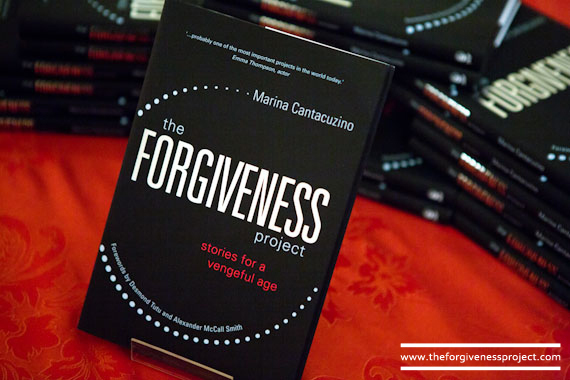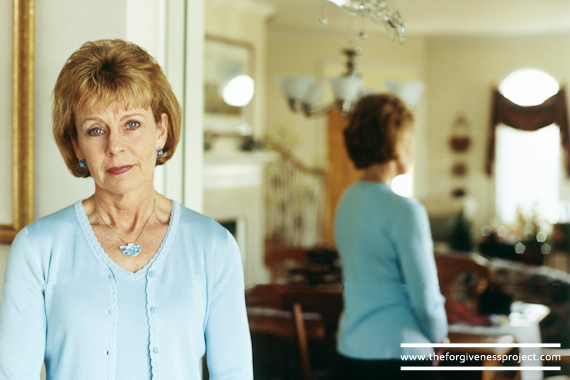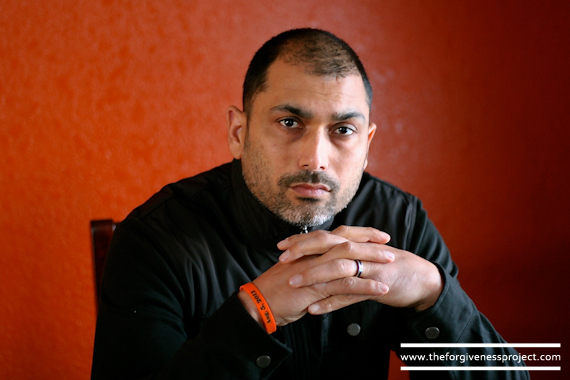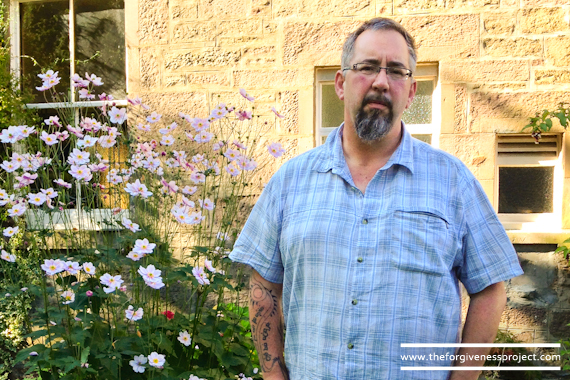On the world's bloody stage of escalating civil war and increasingly brutal acts of terrorism, the prospect of forgiveness and reconciliation these days may seem a fanciful notion devoid of legitimacy.
Consider for instance Islamic State terrorists warning to the UK in February of a "Doomsday attack" that will eclipse the brutal Paris killings and turn "children's hair white." Is this kind of rhetoric so absolute, the positioning so uncompromising, the threat so final that any thought of a public discourse on forgiveness not only pointless now but dangerous too?
Forgiveness is a subject that I've been immersed in for the past 12 years, ever since I founded The Forgiveness Project, a UK-based non-profit which shares stories of conflict transformation in order to inspire others to transform the pain and conflict in their own lives. It is a subject I have also written about and grappled with in the recently published paperback edition of The Forgiveness Project: Stories for a Vengeful Age.
I have always thought that it is unhelpful to talk of forgiveness when people are right in the middle of battle, whether the conflict is between malicious siblings or massacring tribes, because in the height of battle all you can do is concentrate on survival and protect your own. At such times, whether victim or perpetrator there is no time for reflection; and forgiveness, whether for self or for others, requires reflection. In my mind forgiveness only becomes tangible and of value when it is part of a renewal process; when it can repair damaged relationships or eradicate grievances that might otherwise extend and fester across generations.
And yet at a time when violent extremism threatens to destabilize the very core of human rights, the stories we choose to tell seem more important than ever. I agree with the South African psychologist Pumla Gobodo-Madikizela who reflected in her seminal work A Human Being Died That Night that, "If memory is kept alive in order to cultivate old hatreds and resentments, it is likely to culminate in vengeance, and in a repetition of violence. But if memory is kept alive in order to transcend hateful emotions, then remembering can be healing." This is what is called restorative storytelling.
Leading up to the 20th anniversary of the Rwandan genocide in 2014 I met a Rwandan man who had lost his entire family in the killing spree. He warned that critical to the future of his country would be the stories that people chose to share to mark the impending commemoration. He was expressing a need to concentrate on stories and memories that can be presented in a way that encourage healing and reconciliation rather than that re-traumatize or stir up ethnic hatred.
This is why it is so important that we continue to be exposed to narratives of healing and transformation. Even in such complex and entangled stories as that of Penny Beernsten there is hope to be found. Beernsten is referred to briefly in the Netflix original documentary Making a Murderer for having wrongly identified Steven Avery as the man who brutally attacked her in 1985.
Her story is about wrestling with self-forgiveness (for the wrongful identification and its consequences) but it is also about post-traumatic growth. Having chosen to share her story with incarcerated violent men, she told me, "I thought I might be able to help them feel empathy toward their victims. What I didn't realize was how much of my own healing would come through these men."
Research has shown that recovery comes from transforming the trauma through a process of meaning-making, in other words the "intense pursuit of what matters" which in turn puts meaning back into your life, or what child development psychologist Ann Masten terms as a resilience born from "ordinary magic". Recovery typically is about becoming actively engaged in helping others.
Scarlett Lewis, the mother of 6-year-old Jesse who was one of the 20 children murdered at Sandy Hook Elementary school in 2012, declares "reaching out to others has saved me." She is talking about her campaign to ensure children with mental health disorders receive the kind of social and emotional support that her son's young killer never received. Lewis has embraced forgiveness as a resilient response to trauma and says, "Certainly I feel anger at the shooter when I think of the childrens' fear and what he did to their little bodies, but when I think of the pain that he was in I am able to find compassion too."
Similarly Pardeep Kaleka, whose father was murdered on August 5th 2012 when white supremacist Wade Michael Page opened fire on a Sikh temple in Wisconsin, has attributed his healing (and forgiveness) to finding meaning and purpose in what happened. "On August 5th, there was a purpose to what happened. Someone came to our temple trying to divide us, saying that we didn't belong and that we weren't wanted in his country... the purpose of our response is to reach out, to include the other and say this will not happen again."
And the brother of David Haines, the British aid worker who was beheaded by ISIS shortly after the murders of James Foley and Steven Sotloff, has since traveled the world spreading a message of unity, tolerance and understanding despite escalating atrocities from the region. I met Mike Haines last year and his message is unwavering: "I now spend my time going to schools, mosques and churches talking about fighting the forces of hate, whether from Islamic fundamentalists or right-wing extremists. I'm not talking about fighting with weapons. This has got to be an ethical and moral fight."
So while it might not be the right time to offer forgiveness, it is most certainly the right time to talk about it in order if nothing else to draw a line under the dogma of vengeance. Narratives of hope remain an essential antidote at such bleak and uncompromising times. It is well to be reminded of the German philosopher Friedrich Nietzsche, who warned that, "He who fights with monsters should be careful lest he thereby become a monster."




